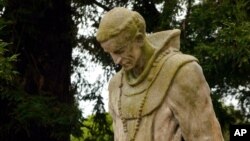Pope Francis celebrated Mass in Rome on Saturday in honor of an 18th-century Franciscan missionary who established a series of Catholic missions along the Pacific coast of what is now the U.S. state of California.
The pope described Father Junipero Serra, a Spaniard who died in 1784, as part of a missionary corps that “went out to all the geographical, social and existential peripheries” to spread the faith among Native Americans.
Francis is expected to canonize Serra — that is, declare him a saint — during his visit to the United States in September.
The plan has stirred controversy. Native American tribal leaders in California say that Serra's work led to the beating and incarceration of local peoples and the suppression of their cultures, and also facilitated the spread of diseases that decimated indigenous populations.
Without referring to specific accusations, Francis praised Serra's missionary zeal and said that he "defended the indigenous people against abuses by the colonizers."
The pope described Serra as one of the founding fathers of the United States and called him “a saintly example of the church's universality and special patron of the Hispanic people of the country."
Serra was beatified, the last step before sainthood, by Pope John Paul II in 1988 after a miracle was attributed to him. Francis waived Catholic Church rules that required another miracle before recognizing sainthood.
The pope’s visit in the United States will include stops in Washington, New York and Philadelphia, where he will attend the World Meeting of Families.
On the way to the United States, the Argentine-born pontiff will visit Cuba. He helped to re-establish contacts between Havana and Washington after more than 50 years of distrust and antagonism between the two nations.








